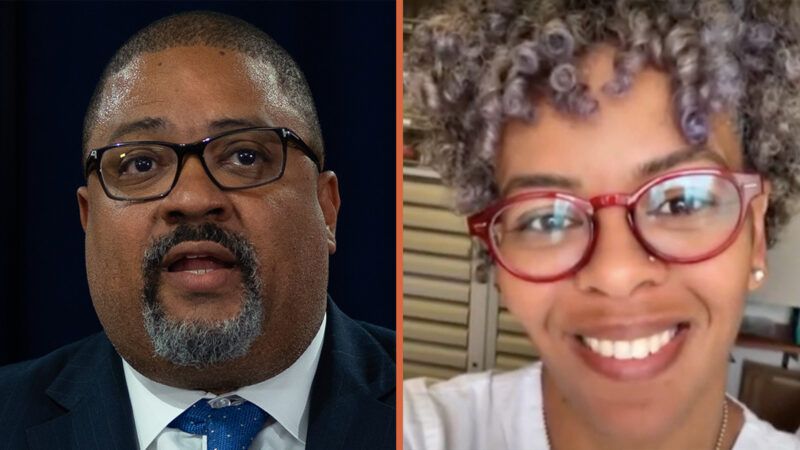Manhattan D.A. Said This Woman Acted in Self-Defense. He Prosecuted Her For Almost a Year Anyway.
Alvin Bragg has finally moved to stop prosecuting Tracy McCarter for murder.

Manhattan District Attorney Alvin Bragg has spent the better part of the last year prosecuting a woman for murder. There's a catch: He publicly expressed, multiple times, that he didn't believe it was a murder.
It's an odd scenario for a prosecutor to put himself in. But for Tracy McCarter, the New York woman who in March 2020 killed her abusive, estranged husband, James Murray, it was more than odd. Bragg explicitly campaigned for office on her innocence, calling the killing "self-defense." And though the evidence would appear to corroborate that assertion, he instead continued the prosecution he promised to end, subjecting McCarter to restrictive bail conditions and proceeding toward a trial.
That changed late last week. "After carefully reviewing all the evidence and extensively discussing this matter with members of my office, I have a reasonable doubt of whether Ms. McCarter stabbed Mr. Murray with the requisite intent to support a conviction of murder in the second degree," Bragg wrote in a letter to Justice Diane Kiesel of the New York State Supreme Court. "I cannot in good conscious allow a prosecution to proceed to trial and ask a jury to reach a conclusion that I have not reached myself."
It's the right move. But Bragg's latter admission lays bare just how bizarre it is that it took him so long to formally arrive at a conclusion he very publicly arrived at years ago. "I #StandWithTracy," he tweeted in September 2020, linking to an article about McCarter's six-month pre-trial stint on Rikers Island, arguably the most notoriously violent jail in the United States. "Prosecuting a domestic violence survivor who acted in self-defense is unjust." The evidence, in some sense, is pretty cut and dry; it includes Murray's arrests for domestic violence, a 2018 email where he admitted to assaulting McCarter, and a video from the following year where a naked and drunk Murray is seen attacking her.
So it's difficult to know why Bragg, whose office declined to comment further, gave McCarter the tough-on-crime treatment. But it's a question worth exploring, particularly when considering that this is the same prosecutor who ascended to office promising to put an end to mass incarceration, to reform bail policies, and to not overcharge. "JUSTICE FOR ALL," his homepage reads.
There are obvious similarities between McCarter's experience and that of Jose Alba, the New York bodega worker who drew viral sympathy this summer after Bragg's office charged him with murder, sent him to Rikers, and initially sought half-a-million-dollar bail to keep him there after surveillance video showed Alba stabbing a confrontational customer in self-defense. Those charges were ultimately dropped. One gaping difference between Alba's and McCarter's cases: The former elicited a conservative media backlash that, as I wrote earlier this year, McCarter was not fortunate enough to receive.
Apart from Bragg's potential hostility toward self-defense claims, there's also the fact that Bragg is a politician, prone to playing politics over fulfilling promises. His letter to Justice Kiesel hints at that: "The procedural history of this case since I became the New York County District Attorney reflects my attempt…to find a disposition that would provide a measure of accountability for Ms. McCarter without asking a jury to reach a conclusion that I cannot reach myself," he wrote. "I make this decision with full awareness of the life that was taken in this tragic incident and the many people who are impacted by Ms. McCarter's stabbing of Mr. Murray." But sometimes there is no "accountability" necessary, particularly when an individual exercises a foundational right to protect their life. People do not have the benefit of conducting an on-the-spot cost-benefit analysis when at risk of sudden death. Tragedy happens sometimes, and justice isn't served when we make someone pay only to balance the scales.
Bragg "righted a grievous injustice," said Sean Hecker, McCarter's attorney, in a statement. "Tracy McCarter is an innocent survivor of domestic violence who has suffered mightily from a criminal justice system that demands change."
McCarter's road to prosecution was littered with problems from the beginning. The grand jury that indicted her did so after the prosecution declined to share the evidence of Murray's abuse. In addition to the aforementioned materials, that also included Murray coming to McCarter's apartment that day—where he did not live—intoxicated after he had been on a bender in her building. She was seen administering CPR and screaming for assistance after the stabbing.
That slipshod approach to her prosecution carried over from former District Attorney Cyrus Vance's administration to Bragg's, who at one point attempted to compromise by having the charge downgraded to manslaughter in the first degree (which still carries up to 25 years in prison). The judge who heard that request—Justice Kiesel—rejected it, because Bragg's office neglected to share that same evidence concerning Murray's history. "They affirm, without reference to exhibit or documentation, that she is a survivor of domestic violence," she wrote.
Kiesel does not have to accept Bragg's request to halt McCarter's prosecution. It may turn on the motion he filed, which, true to form, again declines to cite the available evidence (and appears to have been written in about 15 minutes). If Bragg and Kiesel arrive at another impasse, it will be yet another promise broken to a woman who underwent prosecution for a murder that the city's top law enforcement official readily concedes was not one.


Show Comments (43)